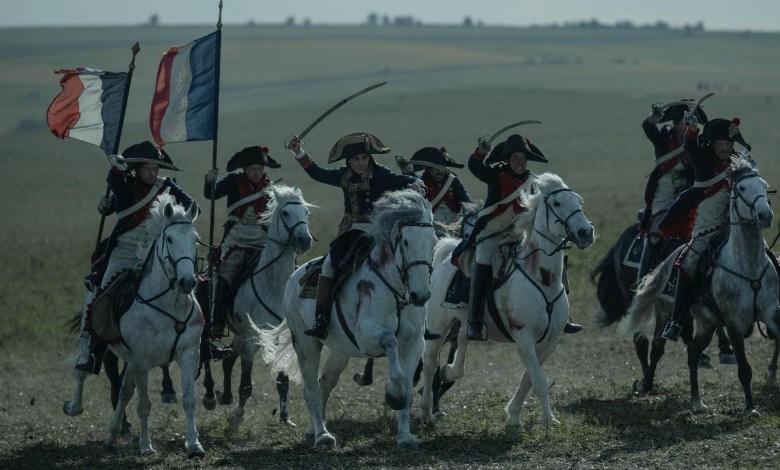
Ridley Scott’s “Napoleon” isn’t “Waterloo” (1970), or that Armand Assante-led TV movie from 1987, nor anything like what Stanley Kubrick designed and nearly made with Jack Nicholson decades ago.
In fact, even if one recalls Scott’s body of work and how often he portrays historical battles (everything from “The Duellists” to “Gladiator” to “Kingdom of Heaven” to “Robin Hood”), “Napoleon” is still a surprise. Yes, the massive action scenes you expect are remarkable, but Scott’s film overall is surprisingly playful, even goofy at times, blending mythic imagery with a rowdy tone.
Scott may be in awe of his central character, but that doesn’t mean he likes him or gives him a movie that avoids how odd and unlikable he presumably was to those closest to him.
Scott’s film depicts the life of Napoleon Bonaparte (played by Joaquin Phoenix) from 1793-1821, as we witness his growth from a promising young officer to a ferocious and effective leader with the ability to lead hundreds into battle and emerge victorious. While Bonaparte conquers every foreseeable enemy and obstacle, he becomes a French Emperor and a leader who is feared worldwide.
Another defining aspect of Bonaparte’s life is his marriage to Josephine (played by Vanessa Kirby) and the film wisely never romanticizes their relationship, nor Napoleon himself. This latter quality is also shared in Scott’s flawed but still underrated “1492: Conquest of Paradise” (1992), in which Christopher Columbus (played by a miscast Gerard Depardieu) was not depicted as a hero but a visionary at sea and an unstable madman with no real leadership skills.
Here, watching Napoleon fumble his way through meetings with dignitaries and trying to maintain control of his unsteady marriage is contrasted greatly with the awesome battle sequences.
Phoenix and Kirby aren’t giving regal, corseted, stiff and starchy turns that one would expect from a costume drama. Yes, this is still a film with French central characters and supporting characters from all over the world, but everyone is speaking English. Yet, the leads offer quirky, instinctive and frisky takes on their roles, devoid of Richard Burton-esque posturing.
There is a wild, somewhat contemporary quality to what Phoenix and Kirby are giving in their portrayals and it’s a risky choice that makes the more laid-back, exposition-heavy scenes especially fascinating to watch; Scott has given them the freedom to find inspired, even odd choices to make and what emerges is devoid of James Ivory-like posturing.
Scott avoids making the same mistakes that plagued Oliver Stone’s “Alexander” (2004), an entertaining failure that couldn’t overcome some glaring miscasting and a third act that went off the rails. The pacing here is a problem, as “Napoleon” is as overlong as the running time would indicate, but there are more than enough highlights to counter the moments that don’t fully connect.
Events like the beheading of Marie Antoinette, the defacing of Egyptian pyramids and the outcome of Waterloo are all vividly depicted. “Napoleon” is not Scott’s best film, nor the very best of 2023 but the extensive, visionary and positively breathtaking sequence depicting the Battle of Austerlitz might be the scene of the year.
There are many great portions here to cherish but the imagery of cannonballs smacking into a frozen lake and trapping soldiers on horseback into a watery grave will never leave me.
View this post on Instagram
While I’m mentioning it, lovers of horses in general shouldn’t even consider seeing this- Scott has provided dreamy equestrian imagery before (notably in his 1986 “Legend”) but here, the shots of horses caked in blood, fallen during battle, and even exploding from cannon fire will rattle anyone who watches “The Black Stallion” annually.
Horse lovers should stay away (it may read like I’m being snarky but I’m actually entirely serious).
For everyone else, Scott’s latest has the visionary quality of his earlier films, the jaw dropping spectacle of his “Gladiator” and the giddy delights of his campy “House of Gucci.” For a filmmaker who is still making knockout, risk-taking and remarkable epics at the age of 88-years old, Scott’s work remains essential, especially on the big screen.
Having Scott take on this material was a natural fit and “Napoleon,” while less than perfect and in need of a definitive Director’s Cut, lives up to its must-see status.
Three and a Half Stars

This is another Napoleon told from the British side. Napoleon created modern France and mobilized sentiment against royals as a concept. Napoleon created huge armies . Hundreds of thousands followed him into battle and millions cheered him. This ridiculous depiction is not that man.
this is gaslighting, the movie sucked.
It’s not gaslighting. It’s a critic’s opinion. Big difference.
I might actually enter a movie theater this decade. The last movie I saw in a theater was “Ben-Hur” in 2016. That movie had poor reviews – mostly because it had a positive reference to Jesus Christ – but I liked the story and the cinematography was outstanding. At any rate, I have a degree in History, so I’ll let the inaccurate scenes slide. From what I’ve read about “Napoleon,” it stays pretty close to historical accuracy but does take some creative license to help the plot move along. It’s refreshing to have a movie not about comic book characters, gay themes or historical revision.
Joaquin Phoenix and Ridley Scott? I’m in.